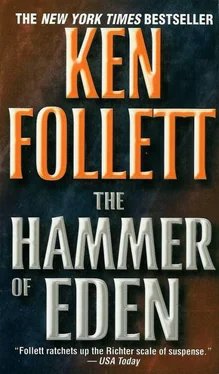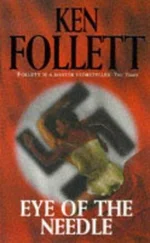He picked up a towel, stepped into his sandals, and went outside naked. His dog, Spirit, greeted him with a quiet snuffle. It was a clear, crisp morning, with patches of high cloud in the blue sky. The sun had not yet appeared over the mountains, and the valley was in shadow. No one else was about.
He walked downhill through the little village, and Spirit followed. Although the communal spirit was still strong, people had customized their homes with individual touches. One woman had planted the ground around her house with flowers and small shrubs: Priest had named her Garden in consequence. Dale and Poem, who were a couple, had let their children paint the outside walls, and the result was a colorful mess. A man called Slow, who was retarded, had built a crooked porch on which stood a wobbly homemade rocking chair.
Priest knew the place might not be beautiful to other eyes. The paths were muddy, the buildings were rickety, and the layout was haphazard. There was no zoning: the kids’ bunkhouse was right next to the wine barn, and the carpentry yard was in the midst of the cabins. The privies were moved every year, to no avail: no matter where they were sited, you could always smell them on a hot day. Yet everything about the place warmed his heart. And when he looked farther away and saw the forested hillsides soaring steeply from the gleaming river all the way to the blue peaks of the Sierra Nevada, he had a view that was so beautiful it hurt.
But now, every time he looked at it, the thought that he might lose it stabbed him like a knife.
Beside the river, a wooden box on a boulder held soap, cheap razors, and a hand mirror. He lathered his face and shaved, then stepped into the cold stream and washed all over. He dried himself briskly on the coarse towel.
There was no piped water here. In winter, when it was too cold to bathe in the river, they had a communal bath night twice a week and heated great barrels of water in the cookhouse to wash one another: it was quite sexy. But in summer only babies had warm water.
He went back up the hill and dressed quickly in the blue jeans and workshirt he always wore. He walked over to the cookhouse and stepped inside. The door was not locked: no doors had locks here. He built up the fire with logs and lit it, put on a pan of water for coffee, and went out.
He liked to walk around when the others were all abed. He whispered their names as he passed their homes: “Moon. Chocolate. Giggle.” He imagined each one lying there, sleeping: Apple, a fat girl, lying on her back with her mouth open, snoring; Juice and Alaska, two middle-aged women, entwined together; the kids in the bunkhouse — his own Flower, Ringo, and Smiler; Melanie’s Dusty; the twins, Bubble and Chip, all pink cheeks and tousled hair…
My people .
May they live here forever .
He passed the workshop, where they kept spades and hoes and pruning shears; the concrete circle where they trod the grapes in October; and the barn where the wine from last year’s harvest stood in huge wooden casks, slowly settling and clarifying, now almost ready to be blended and bottled.
He paused outside the temple.
He felt very proud. From the very beginning they had talked of building a temple. For many years it had seemed an impossible dream. There was always too much else to do — land to clear and vines to plant, barns to build, the vegetable garden and the free shop and the kids’ lessons. But five years ago the commune had seemed to reach a plateau. For the first time, Priest was not worried about whether they would have enough to eat through the coming winter. He no longer felt that one bad harvest could wipe them out. There was nothing undone on the list of urgent tasks he carried in his head. So he had announced that it was time to build the temple.
And here it was.
It meant a lot to Priest. It showed that his community was mature. They were not living hand to mouth anymore. They could feed themselves and have time and resources to spare for building a place of worship. They were no longer a bunch of hippies trying out an idealistic dream. The dream worked; they had proved it. The temple was the emblem of their triumph.
He stepped inside. It was a simple wooden structure with a single skylight and no furniture. Everyone sat cross-legged in a circle on the plank floor to worship. It was also the schoolhouse and meeting room. The only decoration was a banner Star had made. Priest could not read it, but he knew what it said:
Meditation is life: all else is distraction
Money makes you poor
Marriage is the greatest infidelity
When no one owns anything, we all own everything
Do what you like is the only law
These were the Five Paradoxes of Baghram. Priest said he had learned them from an Indian guru he had studied under in Los Angeles, but in fact he had made them up. Pretty good for a guy who can’t read .
He stood in the center of the room for several minutes, eyes closed, arms hanging loosely at his sides, focusing his energy. There was nothing phony about this . He had learned meditation techniques from Star, and they really worked. He felt his mind clarify like the wine in the casks. He prayed that Governor Mike Robson’s heart would be softened and he would announce a freeze on the building of new power plants in California. He imagined the handsome governor in his dark suit and white shirt, sitting in a leather chair behind a polished desk; and in his vision the governor said: “I have decided to give these people what they want — not just to avoid an earthquake, but because it makes sense anyway.”
After a few minutes, Priest’s spiritual strength was renewed. He felt alert, confident, centered.
When he went outside again, he decided to check on the vines.
There had been no grapes originally. When Star arrived there was nothing in the valley but a ruined hunting lodge. For three years the commune had lurched from crisis to crisis, riven by quarrels, washed out in storms, sustained only by begging trips to towns. Then Priest came.
It took him less than a year to become Star’s acknowledged equal as joint leader. First he had organized the begging trips for maximum efficiency. They would hit a town like Sacramento or Stockton on a Saturday morning, when the streets were crowded with shoppers. Each individual would be assigned a different corner. Everyone had to have a pitch: Aneth would say she was trying to get the bus fare home to her folks in New York, Song would strum her guitar and sing “There but for Fortune,” Slow would say he had not eaten for three days, Bones would make people smile with a sign saying “Why lie? It’s for beer.”
But begging was only a stopgap. Under Priest’s direction, the hippies had terraced the hillside, diverted a brook for irrigation, and planted a vineyard. The tremendous team effort made them into a strongly knit group, and the wine enabled them to live without begging. Now their chardonnay was sought after by connoisseurs.
Priest walked along the neat rows. Herbs and flowers were planted between the vines, partly because they were useful and pretty, but mainly to attract ladybugs and wasps that would destroy greenflies and other pests. No chemicals were used here: they relied on natural methods. They grew clover, too, because it fixed nitrogen from the air, and when they plowed it into the soil it acted as a natural fertilizer.
The vines were sprouting. It was late May, so the annual peril of frost killing the new shoots was past. At this point in the cycle, most of the work consisted of tying the shoots to trellises to train their growth and prevent wind damage.
Priest had learned about wine during his years as a liquor wholesaler, and Star had studied the subject in books, but they could not have succeeded without old Raymond Dellavalle, a good-natured wine grower who helped them because, Priest guessed, he wished his own youth had been more daring.
Читать дальше












